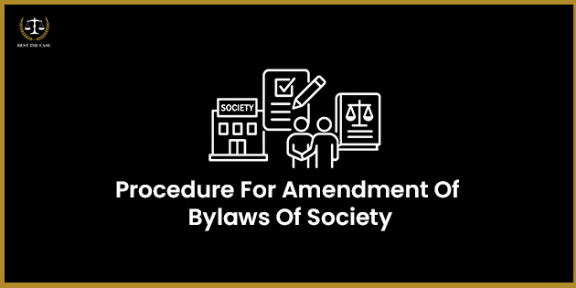Know The Law
Procedure Amendment of Bylaws of Society

1.1. Step 1: Committee Suggests the Change
1.2. Step 2: Send Notice for GBM
1.3. Step 3: Members Approve in GBM
1.4. Step 4: Send for Registrar’s Approval
1.5. Step 5: Registrar Approves and Society Updates Records
2. Documentation Checklists 3. Advantages of Amending Society Bylaws 4. ConclusionIs your housing society still following old rules made years ago? If yes, it might cause problems like legal disputes, confusion, or fines in the future. Society bylaws are simply the rulebook of your society. They explain how the society should run, from collecting maintenance and managing funds to handling parking, members, and meetings. These rules are made as per your State Co-operative Societies Act (for example, the Maharashtra Co-operative Societies Act). The old rules can lead to confusion, disputes, or even legal action. That is why it is important to update them properly. This guide will help you understand how to do it easily and correctly.
like:
- New Laws: When the government changes or adds new rules (like RERA).
- Maintenance: When you want to introduce a new or fair system for calculating maintenance.
- Parking: When you need clear rules for EV charging or parking spots.
- Membership & Fines: When you want to add new penalties or rules for associate members.
How to Update Your Society Rules: Step-by-Step Process
If your housing society wants to change or add new rules (called bylaws), it must follow five legal steps. These steps help make sure the new rules are valid and accepted by the Registrar of Co-operative Societies.
Step 1: Committee Suggests the Change
- The Managing Committee first discusses what needs to be changed.
- They prepare a simple proposal, showing what the old rule is, what the new rule will be, and why it’s needed.
- The committee then passes a resolution (a formal decision) and fixes a date for the General Body Meeting (GBM).
Step 2: Send Notice for GBM
- The secretary must send a written notice to all members at least 14 days before the GBM.
- The notice should clearly say that “Bylaw Amendment” will be discussed in the meeting.
- A copy of the proposed changes should be sent along so everyone knows what’s being changed.
Step 3: Members Approve in GBM
- In the GBM, members vote on the proposed rule changes.
- At least two-thirds (66%) of the members present must agree to pass the change.
- All details, number of votes, final decision, and resolution must be written in the meeting minutes.
Step 4: Send for Registrar’s Approval
- After the GBM, the society must send all documents (minutes, resolution, proposal) to the Registrar of Societies within 60 days.
- The registrar checks if the new rules follow the law and benefit society.
- You can find your local registrar’s office on the state website:
Step 5: Registrar Approves and Society Updates Records
- The new rule becomes official only after the registrar approves it in writing.
- Once approved, the society should:
- Add the new rule to its official records.
- Inform all members through a notice or circular.
Documentation Checklists
Critical documentation checklists are lists of important documents you must have for a process, procedure, or legal requirement. They help make sure you do not miss anything important. For example, in a housing society, a documentation checklist for changing rules might include:
- Proposal showing old and new rules
- Committee resolution approving the change
- Notice sent to all members
- Minutes of the General Body Meeting
- Voting records
- Application to the Registrar
- Registrar’s approval copy
Advantages of Amending Society Bylaws
- Keeps the society legal and up-to-date with new laws like RERA.
- Ensures smooth and clear functioning of the society.
- Makes rules fair and transparent for all members.
- Helps manage maintenance, fines, and finances better.
- Adds rules for new issues like EV parking or digital payments.
- Protects society from legal disputes or penalties.
- Improves overall governance and decision-making.
Conclusion
Achieving a smooth and legally sound bylaw amendment for your cooperative housing society requires precision. By diligently following this five-step roadmap, ensuring the mandatory 14-day notice, securing the crucial Special Resolution (two-thirds majority) at the GBM, and submitting all documents to the Registrar within the strict 60-day deadline, your managing committee can successfully future-proof your society's governance. Do not risk invalid decisions or litigation; registering your updated Society Bylaws is the final, essential step to guarantee legal compliance and lasting financial stability.
Frequently Asked Questions
Q1. What is the amendment of the bylaws of a registered society?
It means updating the society’s rules to meet legal requirements or modern needs. The process includes a Managing Committee proposal, General Body Meeting (GBM) approval, and Registrar approval.
Q2. What is the proper format for a bylaw amendment?
A standard format includes the society name, registration number, current clause, proposed clause, reason for change, committee signatures, GBM date, and voting details.
Q3. How can a cooperative society amend its bylaws?
The society amends rules through committee proposal → GBM special resolution → submission to Registrar of Societies → Registrar approval.
Q4. What does the amendment of the bylaws mean?
It refers to changing or updating existing society rules for legal compliance, better governance, or modern requirements.
Q5. How are bylaws amended in cooperative housing societies?
Bylaws are amended for new laws (like RERA), maintenance changes, EV parking, membership, or fines. The process follows Committee → GBM → Registrar.






